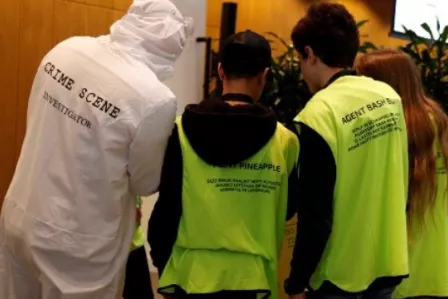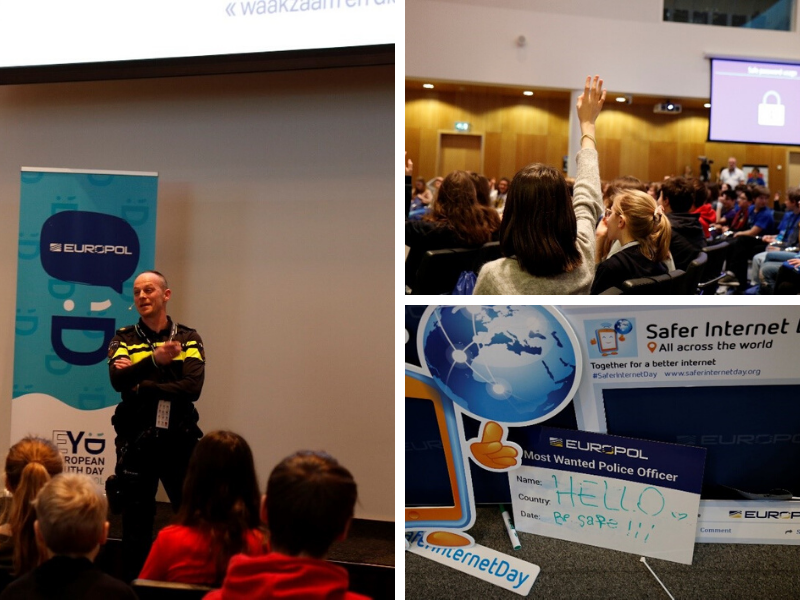On Tuesday, 11 February 2020, Europol marked Safer Internet Day by organising its third European Youth Day, for which 150 students were invited to the organisation's headquarters.

The young people, aged 12-15, came from six schools (International School The Hague, Europese School Den Haag, Deutsche Internationale Schule Den Haag, British School The Netherlands, Lycée Français Vincent van Gogh, Christelijk Gymnasium Sorghvliet) - both international and Dutch – from in and around The Hague. Europol organised the event in collaboration with different partners, such as the Dutch Safer Internet Centre (SIC), the Dutch Helpline (Expertisebureau Online Kindermisbruik), the Dutch High Tech Crime Unit, The Hague police, Twente University, Hack in the Class, Cybersafety4u, LFE management & events, and KPN.
The event was well received by students and teachers, who learned about online safety in a fun way, and by the partners, who got a chance to educate youngsters on their cybersecurity skills and raise awareness of cybersecurity concerns.

Copyright photos: Europol
So, how did Europol do it? It all started in October 2019, when they met a smaller group of 19 pupils and asked for their opinion on having such an initiative hosted at Europol. The idea was to organise an event for children, by children. The group gave the organisers simple instructions: "We want an interactive event where we can learn about online security without feeling lectured in the typical do's and don'ts."
Five months later, Europol delivered. The event in February included presentations, masterclasses and workshops: hands-on experiences where they could hack devices in a controlled environment, learn about the importance of online privacy with magic tricks, jump into a police officer's shoes and follow clues or help two forensic cyber specialists crack a case. Pupils could make the most of a cyber escape room, where they had to find a crime suspect, a CSI experience where they played the part of a cyber squad to help cyber forensic specialists solve an investigation, and think like a chief information security officer (CISO), coming up with a plan to protect their company from cyber threats.
What's next? Europol is currently collecting feedback from the schools and evaluating their opinion on the event as lessons learned for similar activities. They will continue to stay in touch with the youth, allowing them to provide advice on future initiatives and making them an active part of the discussion. One thing is clear: kids are gaining access to technology at younger ages and we must ensure they stay safe while accessing the online world. Perhaps one of the best ways to do so is through prevention and awareness – providing them with the tools and knowledge needed to protect themselves and, eventually, grow up into a cyber-aware generation.
For more information, visit Europol's website and the Safer Internet Day Supporter profile page.
On Tuesday, 11 February 2020, Europol marked Safer Internet Day by organising its third European Youth Day, for which 150 students were invited to the organisation's headquarters.

The young people, aged 12-15, came from six schools (International School The Hague, Europese School Den Haag, Deutsche Internationale Schule Den Haag, British School The Netherlands, Lycée Français Vincent van Gogh, Christelijk Gymnasium Sorghvliet) - both international and Dutch – from in and around The Hague. Europol organised the event in collaboration with different partners, such as the Dutch Safer Internet Centre (SIC), the Dutch Helpline (Expertisebureau Online Kindermisbruik), the Dutch High Tech Crime Unit, The Hague police, Twente University, Hack in the Class, Cybersafety4u, LFE management & events, and KPN.
The event was well received by students and teachers, who learned about online safety in a fun way, and by the partners, who got a chance to educate youngsters on their cybersecurity skills and raise awareness of cybersecurity concerns.

Copyright photos: Europol
So, how did Europol do it? It all started in October 2019, when they met a smaller group of 19 pupils and asked for their opinion on having such an initiative hosted at Europol. The idea was to organise an event for children, by children. The group gave the organisers simple instructions: "We want an interactive event where we can learn about online security without feeling lectured in the typical do's and don'ts."
Five months later, Europol delivered. The event in February included presentations, masterclasses and workshops: hands-on experiences where they could hack devices in a controlled environment, learn about the importance of online privacy with magic tricks, jump into a police officer's shoes and follow clues or help two forensic cyber specialists crack a case. Pupils could make the most of a cyber escape room, where they had to find a crime suspect, a CSI experience where they played the part of a cyber squad to help cyber forensic specialists solve an investigation, and think like a chief information security officer (CISO), coming up with a plan to protect their company from cyber threats.
What's next? Europol is currently collecting feedback from the schools and evaluating their opinion on the event as lessons learned for similar activities. They will continue to stay in touch with the youth, allowing them to provide advice on future initiatives and making them an active part of the discussion. One thing is clear: kids are gaining access to technology at younger ages and we must ensure they stay safe while accessing the online world. Perhaps one of the best ways to do so is through prevention and awareness – providing them with the tools and knowledge needed to protect themselves and, eventually, grow up into a cyber-aware generation.
For more information, visit Europol's website and the Safer Internet Day Supporter profile page.
- < Previous article
- Next article >









